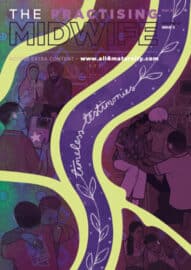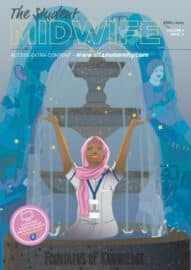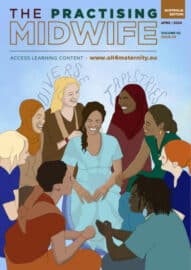Campaign to Reduce Racial Inequalities in Maternity Care: A ‘MyMidwives’ initiative
Georgia Allan and Sheridan Thomas, Registered Midwives

Several health and social care reports over the last few years have repeatedly highlighted that Black people in the UK experience inequality within the healthcare system. Systemic racism permeates every level of our society, whether we are consciously aware of it or not, and the statistics in the latest MBRRACE-UK report would argue that maternity care is no different. In this report, Black women are highlighted as having a 5-fold increase in mortality compared to white women. Analysis of the findings of both the 2018 and 2019 MBRRACE-UK reports strongly suggests racial bias and discrimination as factors in the maternal mortality rate for Black mothers. The Royal College of Obstetricians and Gynaecologists [RCOG] also note that poorer outcomes are extended to the children of Black mothers, stating that Black women are twice as likely to experience a stillbirth than white women.

In view of these harrowing statistics that reflect the racial inequalities in maternity and women’s healthcare in the UK, it begs the question;
Why is more not being done to tackle the fact that black mothers and babies are more at risk of dying?
The 2018 MBRRACE-UK report called for urgent research to “understand why Black women are five times more likely, and Asian women are are twice as likely to die from complications of pregnancy and childbirth compared to white women”.
However, the report led to frustration being expressed in blogs and across social media platforms that the statistics should have led to more urgent national institutional response and there remains very limited studies into why Black mothers are more at risk and what can be done to improve maternal mortality.
historic racism and poorer experiences of healthcare or at work may mean that individuals in BAME groups are less likely to seek care when needed
 The recent Public Health England report stated that “there is a legal duty and moral responsibility to reduce inequalities”. This led us to reflect on our professional duty as midwives as outlined in our NMC Code, to prioritise the people in our care. In order to do that, we must first have an understanding of the lived experience of those we care for.
The recent Public Health England report stated that “there is a legal duty and moral responsibility to reduce inequalities”. This led us to reflect on our professional duty as midwives as outlined in our NMC Code, to prioritise the people in our care. In order to do that, we must first have an understanding of the lived experience of those we care for.
However, educating ourselves about the lived experience of Black people it is an uncomfortable process as in order to do that, we must face the layers of racial inequality that are present throughout every institution within our society. When discussing the lived experience of Black people, Public Health England stated, “historic racism and poorer experiences of healthcare or at work may mean that individuals in BAME groups are less likely to seek care when needed”.
This shocking statement calls for us to acknowledge that there are racial paradigms that exist, and we must examine how policies that produce racial disparities play a role within maintaining racial structures that perpetuate inequality. The findings from the report lend themselves to the sociological idea of ‘intersectional’ oppression and how it can affect access to healthcare and have physical impacts. In this instance, the idea that multiple intersecting forms of oppression such as systemic racism, unconscious bias and sexism can prevent Black women from receiving optimal maternity care.
Acknowledging our privilege can often invoke feelings of shame and guilt. We can find the process too painful and too awkward to discuss, putting race issues into the category of a taboo subject that white people can feel uncomfortable addressing. Examining and acknowledging our privilege then drawing comparisons to the lived experience of those in your care can feel so difficult that many health professionals stop the process at this point.
This leaves unconscious bias unchecked, and any conscious bias that has been raised is often associated with guilt, and no real sense of how to challenge the bias to create real change.
As Professional Midwifery Advocates (PMAs) we want to support midwives in their journey throughout the process of examining how racism plays a part in the system in which they work.
So, what are we doing?
As part of our commitment to improving women’s health we continue to provide education via our social media platforms and have developed a project with an overarching aim to improve access to services for Black and minority ethnic communities. The purpose of our initiative is to create a safe space for midwives and student midwives to examine systemic racism and explore any conscious or unconscious bias that can impact on their practice. Through the facilitation of workshops structured around restorative circles, we encourage participants to take a reflective approach to their own beliefs and any potential conscious or unconscious bias that may affect their practice and the pregnant people in their care.
As PMA’s, we truly believe in the power of a restorative approach to tackling difficult issues within maternity care. A key aspect of the PMA role and the A-EQUIP model is restorative circles. This focuses on giving midwives the time to think in order to develop resilience and focus on their emotional needs through reflective discussion and creating space and opportunity to consider new perspectives.
The topic of race is an uncomfortable subject for many, and whilst we want to challenge midwives to examine their own personal bias, this requires open and honest conversations, that must be nurtured in a supportive manner.

Laburn defined self-awareness as an ever-evolving concept that requires constant re-evaluation and development, so midwives who perceive their practice to be self-aware in matters concerning race will continue to need opportunities to be reflective in their practice. By opening the conversation amongst midwives and raising awareness of the issues that women from Black and Brown communities face, we can together improve maternity care.
We are offering these workshops across the UK, if you would like us to facilitate one at your university or hospital please get in touch via info@mymidwives.co.uk.

To fund the workshops and deliver the sessions as widely as possible we have created our own range of affirmation candles. All candles are hand poured in Cheshire with organic natural soy wax and specially selected essential oils. They are 100% cruelty free and contain no parabens or other harmful products.
Proceeds from the myNOIR candle will always be used to go towards subsiding our workshops and for a limited time the proceeds from the entire myAFFIRMATION range will also go to this funding.
What can you do?
Please, ask questions.
Do the work.
Become educated about the issues that are affecting Black women today. We’ve listed some of our favourite resources here but there’s so much out there.
Then, sit with your own personal bias and examine it.
Really closely. Ask yourself, why am I uncomfortable discussing race?
Then, challenge others. Don’t allow covert or overt racism to be spread in a room in your presence. Challenge others prejudicial comments and belief systems.
This can be done respectfully and peacefully.
Hold people to account. Hold maternity workers to account.
We need to do and be better.
We will say it again.
Birth work is political.
Thank you for reading our blog post,
Sheridan and Georgia

Sheridan

Georgia
Resources
Social media:
- @rachel.cargle
- @renireni
- @laylafsaad
- @ckyourprivilege
- @thegreatunlearn
Books:
- Why I’m No Longer Talking to White People About Race – Reni Eddo-Lodge
- Slay in Your Lane: The Black Girl Bible – Yomi Adegoke and Elizabeth Uviebinené
- Brit(ish). Afua Hirsch
- Me and White Supremacy – Layla F Saad
- I Am Not Your Baby Mother – Candice Braithwaite
- Hood Feminism: Notes From the Women White Feminists Forgot – Mikki Kendall
- Americanah – Chimamanda Ngozi Adichie
Podcasts:
- The Stoop – Hana Baba and Leila Day
- The Echo Chamber – Jade and Ez
- #MeToo and Women of Color – Tarana Burke
- Code Switch – National Public Race
- About Race – Reni Eddo-Lodge
Key Points:
- Pregnant people of Black ethnic origin are five times more likely to die in pregnancy and childbirth than white pregnant people.
- Examining our own racial bias is essential to beginning to combat these statistics and improving maternity care experiences.
- More research is required to evidence why black pregnant people are more likely to die than other ethnicities.
- It is our responsibility to challenge the status quo that allows systemic racism to perpetuate and this starts with examining our own innate and unconscious bias.








